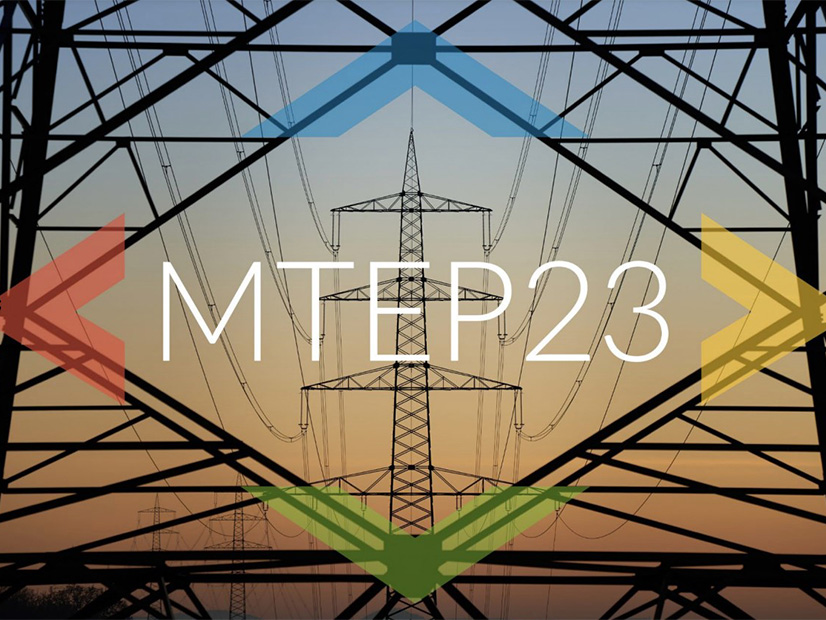Just three of MISO’s 11 member sectors voted to support the RTO’s nearly $9 billion 2023 Transmission Expansion Plan (MTEP 23).
The Environmental, Transmission Owners and Transmission-Dependent Utilities sectors voted in favor of recommending MTEP proceed to the MISO Board of Directors for approval. Other sectors either abstained from voting or did not cast votes. No sectors registered opposition to the portfolio, so the motion to move MTEP 23 forward is considered passed. (See MISO PAC Considers Lower, $9B MTEP 23 Transmission Package.)
MTEP 23 now contains 572 new projects totaling almost $9 billion; 47% of that spending is destined for MISO South.
The low MTEP approval continues a trend of diminishing sector support for MTEP portfolios. In 2022, four sectors voted in favor of the $4 billion MTEP 22. In 2021, six sectors supported the $3 billion MTEP 21.
At an Oct. 18 Advisory Committee teleconference, WEC Energy Group’s Chris Plante asked why so many sectors didn’t register votes this year.
“For a sector to not submit a vote and not explain why, that’s concerning,” Plante said.
Three MISO sectors — the End-Use Customers Sector, Public Consumer Sector and the State Regulatory Sector — regularly abstain from voting on MTEP packages. This year, the Competitive Transmission Developers sector again joined in the abstentions.
LS Power’s Brenda Prokop said the volume of “other” category projects and baseline reliability projects this year was cause for concern among the Competitive Transmission Developers. She also said there’s little transparency into transmission owners’ cost estimates for the sector to confidently back the slate of projects.
Energy consultant Jim Dauphinais said the End-Use Customers Sector doesn’t weigh in on projects because it doesn’t have the resources to conduct a thorough vetting of all MTEP projects. He said his members’ positions on projects are best handled individually in state regulatory processes.
MISO and its System Planning Committee of the Board of Directors held the first of two meetings Oct. 17 to devote more review and discussion to MTEP 23 and the stakeholder comments attached to the draft report this year. MISO’s System Planning Committee typically holds just one meeting in November to consider the annual MTEP.
Senior Director of Transmission Planning Laura Rauch said, “given the magnitude of the projects,” directors needed more time to consider the most expensive MTEP in MISO’s history.
Rauch said most MTEP 23 projects are meant to solve reliability issues caused by localized load additions, especially in MISO South. She said MISO is not experiencing a regional, across-the-board increase in load that would justify regional project identification. She said MISO analyzed the largest MTEP 23 projects for potential as regionally cost-shared, market efficiency projects, but none could meet MISO’s minimum 1.25:1 benefit-to-cost requirement.
Rauch told directors that members’ comments this year on MTEP 23 likely will push MISO to consider HVDC and battery storage in future MTEP and long-range transmission plan (LRTP) portfolios.
She also touched on MISO delaying recommendation of the $260 million third phase of Entergy Louisiana’s Amite South reliability project into 2024 so it can better scrutinize the project.
“Certainly, we don’t think this is a bad project, but we need additional time for analysis,” Rauch said. She said MISO will bring the project back to board members once it completes its alternatives study on the project.
Rauch said the slew of large, reliability-driven projects in MISO South won’t impede MISO’s plans to focus on the South region for the third portfolio of its LRTP. MISO remains committed to discussing the scope of the third LRTP in 2024, Rauch said.
MTEP 23 will go before the full MISO Board of Directors for approval at their quarterly meeting on Dec. 7 in Orlando, Fla.
Relatedly, MISO this week launched a new MTEP Planning Portal, the nonpublic platform members use to submit and update MTEP project proposals.




